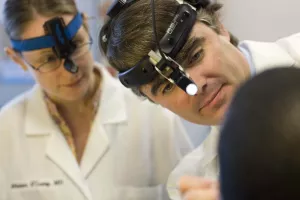Chronic sinusitis often feels like a never-ending cold or a sinus infection that just won’t ease up. When it comes to helping you with troublesome sinuses, our care team’s collaborative approach will feel like a breath of fresh air.
We know noses
Your sinuses make up a system that touches 4 parts of your face: between the eyes, cheeks, lower forehead and nose. That’s why when you have a sinus infection, you can feel pressure across your face or like your head is underwater.
We look at 2 major factors that can cause your sinuses to act up:
- Your environment, like the trees in your backyard
- Your anatomy, like the positioning of bones in your nose

Conditions
Common symptoms of chronic sinusitis (or rhinosinusitis) may include:
- Change in voice
- Facial pain
- Hoarseness
- Loss of smell
- Nasal obstruction
- Runny nose
- Trouble sleeping
These symptoms can link to:
- Environmental allergies: These are relatively common and can be a major factor in developing chronic rhinosinusitis.
- Nasal polyps: Nasal polyps are little inflamed sacs that line the nose or sinuses. We can remove them, but polyps can grow back. Nasal polyps can link to aspirin sensitivity and asthma.
- Structural or cartilage abnormalities: People with structural or cartilage abnormalities often struggle with their sinuses because of bone abnormalities blocking where the sinuses drain.
Other less common conditions that cause chronic sinusitis include:
- Immune deficiencies
- Fungal hypersensitivity sinusitis
- Forms of vasculitis, like Wegener’s Granulomatosis
Testing
Our teams of allergists and ENT specialists know a thing or two about noses. To better understand yours and the rest of your sinuses, we’ll perform one or a combination of the following diagnostics:
- Allergy skin testing
- Immune system testing for immunoglobulin levels and responses to pneumococcal polysaccharide vaccines
- Sinus CT scan
- Nasal endoscopy
- Testing for aspirin sensitivity
Treatments
We don’t want you to suffer from chronic sinusitis any longer. Your treatment plan may include one or a combination of the following treatments:
- Topical nasal corticosteroid regimens and nasal irrigations
- Antibiotics paired with other measuress
- Oral corticosteroid regimens (typically short-term and used to treat bacterial or fungal infections or nasal polyps)
- Nasal surgery or functional endoscopic sinus surgery (FESS)
- Allergen immunotherapy (subcutaneous immunotherapy is our standard treatment, but we can consider sublingual immunotherapy)
- Aspirin desensitization
- Immunoglobulin replacement for immunodeficiency

From regular office visits to inpatient stays, find the healthcare you need and deserve close to home.

Meet the doctors and care team devoted to supporting you every step of the way along your path to better health.